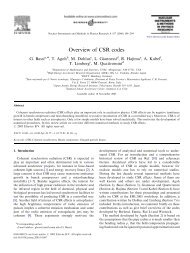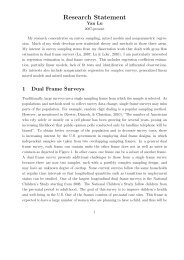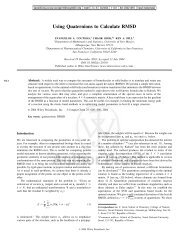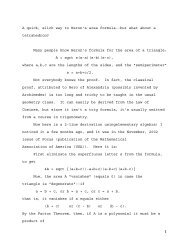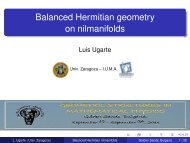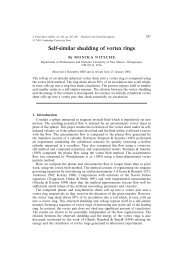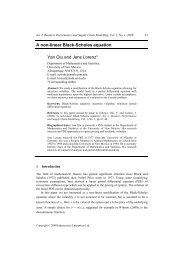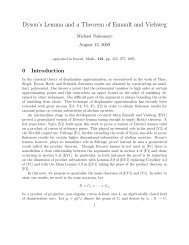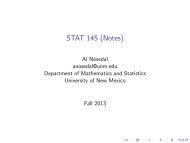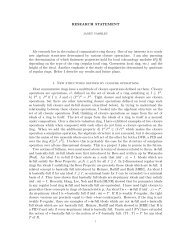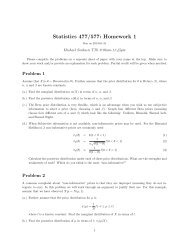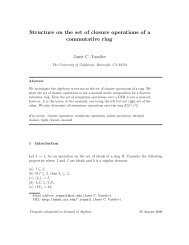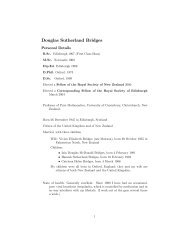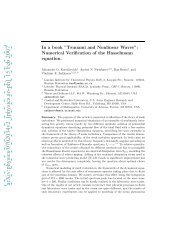OEO Office of Equal Opportunity - Department of Mathematics and ...
OEO Office of Equal Opportunity - Department of Mathematics and ...
OEO Office of Equal Opportunity - Department of Mathematics and ...
You also want an ePaper? Increase the reach of your titles
YUMPU automatically turns print PDFs into web optimized ePapers that Google loves.
216 ARTS AND SCIENCES<br />
program in lieu <strong>of</strong> one <strong>of</strong> the required fields in history. Details<br />
are available in the <strong>Department</strong>.<br />
Graduate Program<br />
Graduate Coordinator<br />
Timothy Moy<br />
Application Deadlines<br />
Fall semester: January 15<br />
Spring <strong>and</strong> Summer semesters: October 15<br />
Financial Aid: January 15<br />
Degrees Offered<br />
M.A. in History<br />
Concentrations: The Western World to 1500, Europe 1500–<br />
1815, Europe since 1815, United States, American West,<br />
Latin America, Asia.<br />
Prerequisites for admission: a Bachelor’s degree in History or<br />
a related field, which should include general European <strong>and</strong><br />
American history, some advanced course work, <strong>and</strong> a senior<br />
thesis or course in historiography or historical methodology.<br />
Ph.D. in History<br />
Concentrations: Ancient, Medieval Europe, Modern Europe<br />
to 1815, Europe since 1815 (or a regional or topical subspecialty<br />
therein), United States to 1877, United States since<br />
1877, American West, Latin America to 1810, Latin America<br />
since 1810, Asia to 1600, Asia since 1600, Comparative<br />
History <strong>of</strong> Women <strong>and</strong> Gender.<br />
Prerequisite for admission: an M.A. in History or an equivalent<br />
degree approved by the departmental admissions committee.<br />
Degree Requirements<br />
General<br />
For University requirements for the M.A. <strong>and</strong> Ph.D. degrees<br />
consult the appropriate pages <strong>of</strong> this catalog. The following<br />
are general department requirements for History graduate<br />
programs. For more detailed requirements, consult the<br />
<strong>Department</strong> <strong>of</strong> History M.A. Program Requirements or the<br />
<strong>Department</strong> <strong>of</strong> History Ph.D. Program Requirements.<br />
Course work: all students must take History 665, normally in<br />
the first year <strong>of</strong> study. At least half <strong>of</strong> each student’s required<br />
credit hours (exclusive <strong>of</strong> thesis or dissertation) should be<br />
earned in graduate seminars. No more than 6 hours <strong>of</strong><br />
“problems” (697–698) courses may count toward either the<br />
M.A. or Ph.D. degree.<br />
Foreign language: each student must demonstrate a reading<br />
knowledge <strong>of</strong> one foreign language by passing a written<br />
departmental translation examination, or by presenting 12<br />
credit hours <strong>of</strong> instruction in a single foreign language taken<br />
after admission to the graduate program.<br />
M.A.<br />
Program options: students may elect a thesis (Plan I) or<br />
non-thesis (Plan II) program as specified under the general<br />
M.A. requirements in this catalog. The thesis option must be<br />
approved in advance by the supervising pr<strong>of</strong>essor. All theses<br />
must be written in English.<br />
Concentrations: each student must select a concentration<br />
from the M.A. concentrations listed above. Plan II students<br />
will also select an additional concentration from History or<br />
another discipline. Students must take at least one graduate<br />
seminar in each <strong>of</strong> their concentrations. Student must pass a<br />
general written examination in their concentration.<br />
Ph.D.<br />
Concentrations: students select three fields <strong>of</strong> study, two concentrations<br />
<strong>and</strong> an additional field, from the Ph.D. concentrations<br />
listed above. Students must take at least two seminars<br />
in each <strong>of</strong> their concentration <strong>and</strong> field unless insufficient<br />
seminars are available, in which case other courses may<br />
be substituted with departmental approval. Students must<br />
demonstrate competency in their fields by written <strong>and</strong> oral<br />
comprehensive examinations in the two concentrations <strong>and</strong><br />
by written examination in the additional field.<br />
Second foreign language: in addition to the departmental language<br />
requirement (see above), students with a concentration<br />
in any area <strong>of</strong> European, Latin American or Asian history<br />
must demonstrate competence in a second foreign language<br />
appropriate to their course <strong>of</strong> study.<br />
Breadth requirement: each student’s program <strong>of</strong> study must<br />
include at least three graduate courses concerning a single<br />
geographic area outside the current boundaries <strong>of</strong> the United<br />
States. At least one <strong>of</strong> these must be a University <strong>of</strong> New<br />
Mexico History course.<br />
Dissertation: History dissertations must be written in English.<br />
History (HIST)<br />
I. Survey Courses<br />
101L. Western Civilization to 1648. [Western Civilization.]<br />
(3) Bokovoy, Graham, Robbins, Rubenstein, Sanabria,<br />
Steen, Spidle<br />
Ancient times to 1648. Meets New Mexico Lower Division<br />
General Education Common Core Curriculum Area V:<br />
Humanities <strong>and</strong> Fine Arts (NMCCN 1053). {Summer, Fall,<br />
Spring}<br />
102L. Western Civilization Post 1648. [Western<br />
Civilization.] (3) Bokovoy, Robbins, Sanabria, Slaughter,<br />
Steen, Spidle<br />
1648 to present. Meets New Mexico Lower Division General<br />
Education Common Core Curriculum Area V: Humanities <strong>and</strong><br />
Fine Arts (NMCCN 1063). {Summer, Fall, Spring}<br />
161L. History <strong>of</strong> the United States to 1877. (3) Connell-<br />
Szasz, Hutton, S<strong>and</strong>oval-Strausz, Scharff, Szasz, Yazawa<br />
Survey <strong>of</strong> the economic, political, intellectual <strong>and</strong> social<br />
development <strong>of</strong> the United States, including the place <strong>of</strong> the<br />
U.S. in world affairs from 1607 to 1877. Meets New Mexico<br />
Lower Division General Education Common Core Curriculum<br />
Area V: Humanities <strong>and</strong> Fine Arts (NMCCN 1113). {Summer,<br />
Fall, Spring}<br />
162L. History <strong>of</strong> the United States Since 1877. (3)<br />
Connell-Szasz, Farber, Hutton, Moy, S<strong>and</strong>oval-Strausz,<br />
Scharff, Szasz, Yazawa<br />
Survey <strong>of</strong> the economic, political, intellectual <strong>and</strong> social development<br />
<strong>of</strong> the United States, including the place <strong>of</strong> the U.S.<br />
in world affairs from 1877 to the present. Meets New Mexico<br />
Lower Division General Education Common Core Curriculum<br />
Area V: Humanities <strong>and</strong> Fine Arts (NMCCN 1123). {Summer,<br />
Fall, Spring}<br />
204. Greek Civilization. (3)<br />
(Also <strong>of</strong>fered as CLST, PHIL, ARTH 204.) An interdisciplinary<br />
introduction to the ancient world as the foundation <strong>of</strong> modern<br />
civilization. Lectures on classical art, history, literature <strong>and</strong><br />
philosophy. {Spring}<br />
205. Roman Civilization. (3)<br />
(Also <strong>of</strong>fered a CLST, PHIL, ARTH 205.) An interdisciplinary<br />
introduction to ancient Rome. Lectures on Roman literature,<br />
history, art <strong>and</strong> philosophy.<br />
UNM CATALOG 2006–2007 Symbols, page 611.



